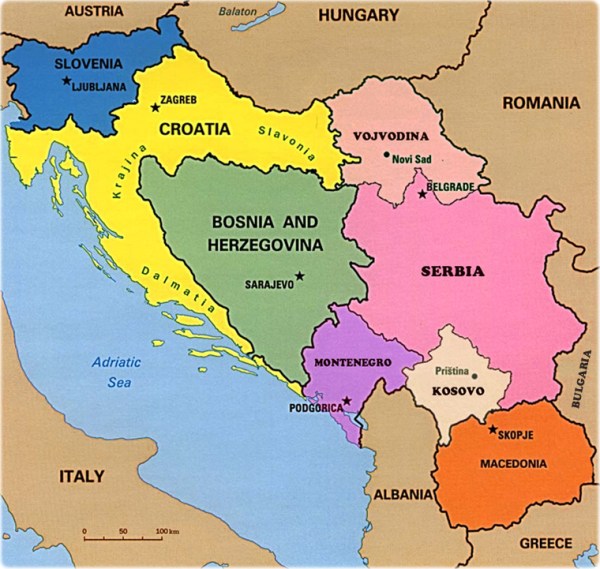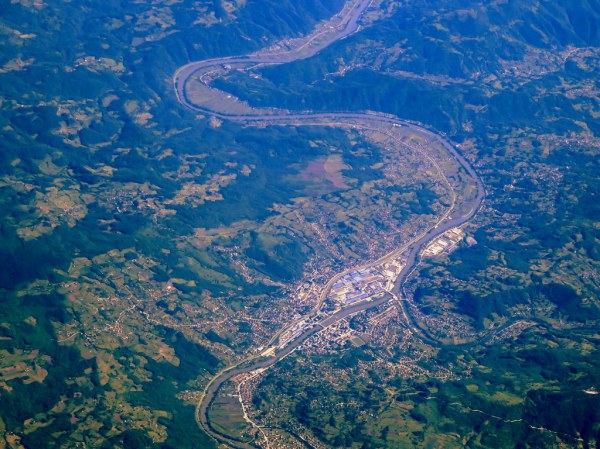Punishment that Turned out to be a Blessing
In early 1941 Germany, together with her Italian, Hungarian, and Rumanian allies, had invaded and occupied the multiethnic Balkan country of Yugoslavia. During that time, in punitive response to his refusal to join the SS, Papa received a disciplinary transfer to the Bosnian town of Zavidovici as commander of a battalion. Fierce fighting raged between the Axis armies and the various partisan groups. Under the leadership of Josef Tito, some 70,000 resistance fighters were conducting guerilla warfare against the invaders. By contrast, the provinces of Croatia and Bosnia-Herzegovina were experiencing a period of relative peace and calm until January 1945.

Here at the banks of the River Bosna, Papa was in charge of general security around Zavidovici. The town nestled between dense forests reaching high into the mountains was blessed with large tracts of fertile land along the riverbanks. The area provided plenty of food for the local people and the security forces. The soldiers lived in nearby barracks.

Local dairies delivered milk, butter, and various fine Balkan cheeses. Farmers sold eggs, meat, corn and wheat, while tobacco plantations ensured a good supply of high-quality cigarettes. Most of these products had become very scarce back home in Germany. So ironically, in the land where the war was being fought mercilessly against Tito’s communist partisans, Papa enjoyed the good life in a relatively safe region loyal to Germany.
He was lucky for the time being …
LikeLike
So I guess it wasn’t much of a punishment. Where was his family? Did they go with him?
LikeLiked by 1 person
Dear Someone, see the comment above for the answer to your question.
LikeLike
So it wasn’t much of a punishment. But was his family with him? Or were they back in Germany?
LikeLiked by 1 person
No his family was back home in Gotha. As you will find out very soon a miraculous event saved his life. Thanks for your kind comments, Amy!
LikeLiked by 1 person
Nun ja.
LikeLike
Stationed in an area that did not have active combat was a blessing. Good food and quiet was in stark contrast to what others were enduring.
LikeLiked by 1 person
Walter Panknin (1898 – 1977) and His Family – Part 7 On Friday, May 14, 2021, The Peter and Gertrud Klopp Family Project wrote:
> Peter Klopp posted: ” Punishment that Turned out to be a Blessing In early > 1941 Germany, together with her Italian, Hungarian, and Rumanian allies, > had invaded and occupied the multiethnic Balkan country of Yugoslavia. > During that time, in punitive response to his refusal ” >
LikeLike
A silver lining but undoubtedly only for a short time. Good for him for refusing to join the SS.
LikeLiked by 1 person
everything very complex and difficult to classify.
Today I was back at the Ehrenfriedenhof in Gemünden.
16year olds died here in April 1945 as the last resistance. Born in 1928, they could still be alive now.
LikeLiked by 1 person
Ja, ich kenne einen Bayer. Er wohnt hier ganz allein in unserem Dorf. Jahrgang 1926. Er war deutscher Soldat in Frankreich. Er hatte Glück und geriet 1944 in englische Gefangenschaft.
LikeLiked by 1 person
Wie sind die da behandelt worden?
LikeLike
Might refusal to join the S.S have resulted in a worse fate than being sent to another country?
LikeLike
Was there another post? I see a new email notification, but it leads to an error message.
LikeLike
Yes, there was another post that I was going to publish in a couple of weeks. I had accidentally pressed the publish button instead of the preview button.
LikeLiked by 1 person
Been there, done that!
LikeLiked by 1 person